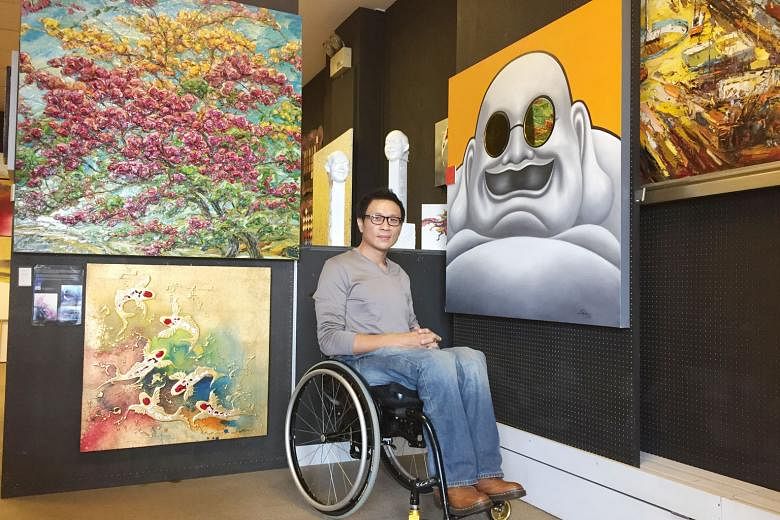Art gallery owner Allan Tan has run a business for 10 years, is married and has a six-year-old son, and plays basketball.
But some people cannot see beyond his disability. Mr Tan, 49, was struck by polio when he was three years old.
"When I hang out with my group of friends, sometimes they forget about (my disability) and walk so fast," he said. But not strangers. They think he is hampered because of polio.
He said that he can look after himself, thank you. And it is not just Mr Tan who feels this way.
The vulnerable, including people with disabilities and those recovering from mental-health issues, feel they are not allowed to make their own decisions.
The first large-scale study of the quality of life (QOL) conducted by the National Council of Social Service (NCSS) last year showed that half of the people with disabilities perceived themselves as lacking autonomy in making big decisions and having control over their lives.
The mother of one respondent quoted in the study prevented her disabled child from doing anything, including washing the dishes. But beyond daily chores, some of the respondents also felt they were not allowed to make decisions even on health matters.
The study surveyed nearly 3,500 Singaporeans and permanent residents aged 18 years and above, including about 2,500 seniors (aged 50 years and above), people with disabilities, and people recovering from mental-health issues and seeking help. Another 958 surveyed were physically and mentally well and formed the control group.
The NCSS researchers compared the responses of the vulnerable group against those from the control group.
The study was based on the World Health Organisation's (WHO) QOL framework, which comprises six areas - physical, level of independence, social relationships, environment, psychological and personal beliefs.
The QOL includes an individual's perception of his position in life in the context of the culture and value systems in which he lives, and in relation to his goals, expectations, standards and concerns.
"The study shows us what directions we need to take. (People with disabilities) actually know what they want," said Ms Fazlin Abdullah, director of the advocacy and research team at NCSS.
Ms Fazlin, who is the principal investigator for the study, added: "People should now start accepting that." She said the study also quoted people with disabilities wanting "to prove that we can work" and "to feel valuable and learn new things".
The survey results showed while the majority of vulnerable people feel accepted in society, they do not feel socially included.
Ms Fazlin said social service organisations and companies have a part to play in helping people from vulnerable groups be more socially included.
This includes seeing vulnerable individuals as people with aspirations and abilities. Doing so will help them achieve their potential in areas such as employment, education and in the community.
The QOL study is slated to be published in September and can help guide the development of programmes and research.
She said the study will be one of the guiding factors for a new five-year road map for the social service sector, called the Social Service Sector Strategic Thrusts, which will be announced next month.
Correction note: This story has been edited to correct the name of Social Service Sector Strategic Thrusts.


